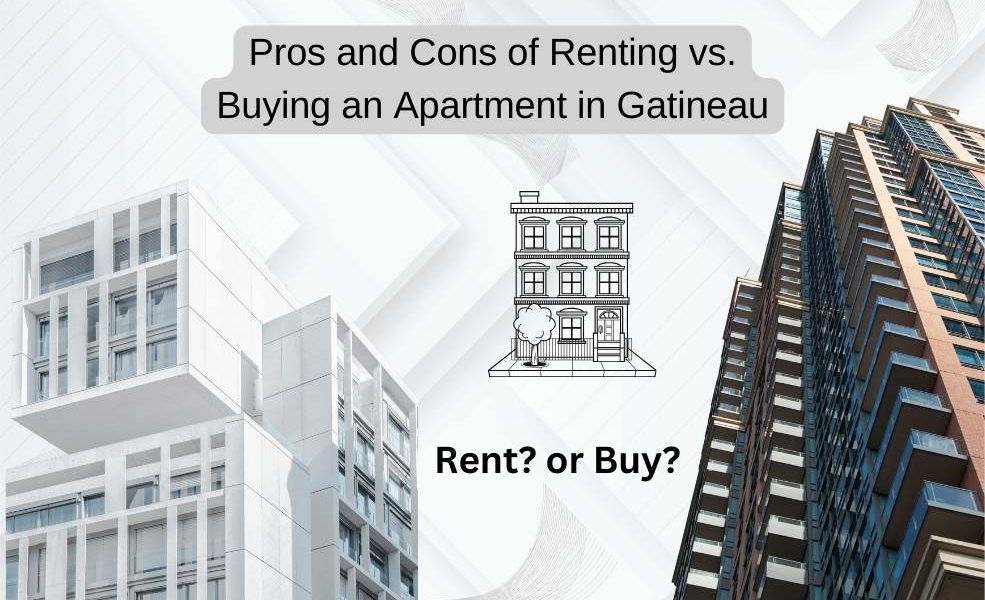Gatineau’s thriving rental market and growing real estate scene make it a popular choice for those looking for a place to live. But the big question remains: Is it better to rent or buy an apartment in Gatineau?
Both options have their advantages and drawbacks, depending on your financial situation, lifestyle, and long-term goals. Whether you’re looking for flexibility or long-term stability, understanding the pros and cons can help you make the right decision.
Pros of Renting an Apartment in Gatineau
1. Lower Upfront Costs
One of the most significant advantages of renting is the lower initial financial commitment compared to buying. Purchasing a home requires a substantial down payment—typically 5% to 20% of the property’s value—along with closing costs, legal fees, and mortgage-related expenses.
In contrast, renters only need to pay:
- First and last month’s rent
- A security deposit (if required)
- Possible application fees
According to data from the Canada Mortgage and Housing Corporation (CMHC), the average down payment on a home in Gatineau ranges from $20,000 to $50,000, depending on the property type and price. For many individuals, saving this amount can take years. Renting allows people to secure housing without this hefty financial burden, making it a more accessible option for those with limited savings.
2. Flexibility to Move
Renting provides unmatched flexibility, making it ideal for:
- Young professionals who may need to relocate for career opportunities.
- Students and newcomers adjusting to life in a new city.
- Individuals uncertain about long-term commitments to a specific neighborhood.
A study by Statistics Canada found that nearly 25% of renters relocate within five years, compared to just 5% of homeowners. Renting allows for seamless transitions without the stress of selling a property or dealing with market conditions.
Additionally, renters have access to new apartments in Gatineau with modern layouts, upgraded amenities, and flexible lease options, making it easier to find a home that meets their needs while maintaining financial flexibility.
3. No Maintenance Responsibilities
Owning a home means taking full responsibility for repairs, renovations, and maintenance. In Gatineau, property maintenance costs can add up quickly. Homeowners typically spend 1% to 3% of their home’s value annually on upkeep, which includes:
- Plumbing and electrical repairs
- Appliance replacements
- Exterior maintenance like roofing and landscaping
Renters, however, don’t have to worry about these expenses. Landlords are legally obligated to maintain the property in good condition, ensuring that tenants aren’t financially burdened by sudden repairs.
4. No Market Risk
The real estate market is unpredictable. Property values in Gatineau have experienced fluctuations, with prices rising steadily over the past decade but also facing occasional slowdowns. Homeowners bear the risk of buying at a market peak and struggling to sell if values decline.
Renters avoid this risk entirely. They don’t have to worry about:
- Property depreciation
- Mortgage rates increasing
- Unexpected housing market crashes
This makes renting a safer option for those who don’t want to deal with the uncertainties of real estate investments.
Cons of Renting an Apartment in Gatineau
1. No Equity Building
One of the biggest downsides of renting is that it doesn’t contribute to long-term wealth building. Every rent payment goes to the landlord rather than building home equity—the value you own in a property.
For example, if you pay $1,500 per month in rent, you’re spending $18,000 per year without any return. Homeowners, on the other hand, benefit from:
- Property appreciation over time
- Equity accumulation with each mortgage payment
- The ability to sell at a profit in a growing market
A report from RE/MAX Canada shows that home prices in Gatineau have increased by 8.5% annually, meaning homeowners who buy today could see significant gains in the future. Renters miss out on this financial growth.
2. Rent Increases Over Time
While mortgage payments remain fixed in most cases, rent is subject to increases. In Gatineau, landlords must follow Quebec’s rent control guidelines, but rental rates still tend to rise yearly due to:
- Inflation
- Increased property taxes
- High demand for housing
According to CMHC data, rental rates in Gatineau have grown by 4% to 6% per year on average. This means that while renting may seem affordable now, long-term costs could eventually surpass what a homeowner would pay for a mortgage.
3. Limited Personalization
Renting comes with restrictions on renovations, which can be frustrating for those who want to personalize their living space. Landlords often prohibit major changes such as:
- Painting walls in bold colors
- Installing custom fixtures
- Making structural modifications
For individuals who enjoy designing their home to fit their style, these restrictions can feel limiting. Homeownership, on the other hand, allows for full creative control over the property.
4. Less Stability
Renters face uncertainty because landlords have the right to:
- Sell the property
- Not renew a lease
- Increase rent beyond affordability
Unlike homeowners, who have full control over their living situation, renters must be prepared for potential changes that could force them to relocate.
A survey by the Canadian Real Estate Association (CREA) found that 32% of renters have had to move due to circumstances beyond their control, including landlords selling properties or converting rentals into condos. This lack of stability can be stressful, especially for families and individuals looking for long-term security.
Final Thoughts: Is Renting Right for You?
Renting in Gatineau comes with financial flexibility, fewer responsibilities, and mobility, making it an attractive choice for those who aren’t ready for the long-term commitment of homeownership. However, it also has drawbacks such as rising rent, lack of equity building, and limited control over your living space.
Who Should Rent?
- Individuals who need short-term housing solutions.
- Young professionals or students with uncertain career paths.
- Those who prefer lower upfront costs and zero maintenance responsibilities.
Who Should Consider Buying Instead?
- People who plan to stay in Gatineau long-term.
- Those who want to build equity and invest in property value appreciation.
- Individuals ready for the financial commitment of homeownership.
Ultimately, the decision depends on your financial goals, lifestyle preferences, and long-term plans. If you value stability and wealth-building, buying may be the better choice. But if you prioritize flexibility and lower upfront costs, renting could be the right fit.
Pros of Buying an Apartment in Gatineau
1. Building Equity and Wealth
Unlike renting, where monthly payments go to a landlord, homeownership allows you to build equity—the difference between your home’s market value and the remaining mortgage balance. Every mortgage payment contributes to ownership, increasing your net worth over time.
Financial Benefits of Equity Growth
- As property values appreciate, homeowners benefit from capital gains when selling.
- Equity can be leveraged for loans or refinancing, providing financial flexibility.
- Real estate is a long-term investment that historically appreciates in value.
According to data from the Canadian Real Estate Association (CREA), home values in Gatineau have risen by an average of 8.5% per year, making property ownership a solid investment.
2. Stable Monthly Payments
One of the biggest financial advantages of homeownership is payment stability. With a fixed-rate mortgage, your principal and interest payments remain the same, offering long-term financial predictability.
Why Stability Matters
- Renters in Gatineau face yearly rent increases due to inflation and market demand.
- Homeowners can budget more effectively without worrying about unexpected rent hikes.
- Over time, mortgage payments may become cheaper than rent as property values rise.
A study by CMHC found that while rents in Gatineau have increased by 4% to 6% per year, fixed mortgage holders enjoy consistent payments, making ownership a financially secure option.
3. Freedom to Customize
Unlike renting, homeownership allows you to fully personalize your space without seeking a landlord’s permission. Whether you want to:
- Renovate the kitchen with modern appliances.
- Install energy-efficient windows to reduce utility costs.
- Upgrade bathrooms or flooring to increase resale value.
Customization not only enhances your quality of life but also increases property value, making it a smart financial move for long-term homeowners.
4. Potential for Rental Income
Owning an apartment also provides income-generating opportunities. If you don’t occupy the property full-time, renting it out can:
- Offset mortgage payments and help cover property taxes.
- Generate passive income, improving financial stability.
- Provide a retirement investment, as rental properties appreciate over time.
According to Rentals.ca, the average rent for a one-bedroom apartment in Gatineau is around $1,500 per month, meaning homeowners who rent out their space can generate significant income. Many buyers purchase properties specifically for rental purposes, turning their apartments into profitable assets.
Cons of Buying an Apartment in Gatineau
1. Higher Upfront Costs
Purchasing an apartment requires a substantial initial investment, including:
- Down payment (typically 5%-20% of the property value).
- Closing costs (legal fees, land transfer tax, mortgage insurance).
- Home inspection fees and additional transaction costs.
For a $350,000 apartment in Gatineau, a minimum 5% down payment would be $17,500, plus closing costs of $6,000 to $10,000. This upfront investment can be a barrier for many first-time buyers.
2. Responsibility for Maintenance
Unlike renters who rely on landlords for repairs, homeowners are fully responsible for maintenance and unexpected repairs. These costs can add up quickly, including:
- Plumbing and electrical repairs ($150–$500 per service call).
- Roof repairs or replacements ($5,000–$15,000).
- Appliance replacements ($500–$2,500 per unit).
The general rule of homeownership is to set aside 1% of the home’s value annually for maintenance, meaning a $350,000 apartment requires $3,500 per year in upkeep.
3. Less Flexibility
Renting offers the freedom to move easily, but selling a home is a longer and more complex process. Homeowners who need to relocate must deal with:
- Real estate agent fees (typically 3%-5% of the sale price).
- Market conditions affecting resale value.
- Possible delays in finding a buyer.
If you anticipate frequent relocations, buying may not be the best choice unless you plan to rent out the property instead.
4. Market Fluctuations
While real estate generally appreciates, the market can also decline, affecting resale value. Homeowners bear the risk of:
- Buying at a market peak and selling at a loss.
- Higher mortgage rates increasing long-term costs.
- Economic downturns impacting property demand.
A report from CMHC found that home values in Canada dropped by 5% in 2023, proving that even in a growing market like Gatineau, property investments are not without risk.
Final Verdict: Is Buying Right for You?
Buying an apartment in Gatineau offers long-term financial benefits, equity growth, and stability, making it an excellent choice for those committed to staying in one place and investing in property appreciation. However, it also requires a large financial commitment and ongoing maintenance responsibilities.
Who Should Buy?
- Individuals with stable income and long-term financial goals.
- Those looking to build equity instead of paying rent.
- People ready for home maintenance responsibilities.
Who Should Wait?
- Individuals who plan to move frequently for work or personal reasons.
- Those who lack savings for a down payment.
- Renters who prefer financial flexibility over long-term investment.
If you’re financially prepared and plan to stay in Gatineau long-term, buying an apartment can be a smart investment. However, if you prioritize flexibility and lower upfront costs, renting may be the better option.
Which Option Is Right for You?
Choose Renting If:
- You want flexibility to move.
- You’re not ready for long-term financial commitments.
- You prefer minimal maintenance responsibilities.
Choose Buying If:
- You plan to stay in Gatineau long-term.
- You want to build equity and invest in property.
- You have savings for a down payment and ongoing expenses.
Both renting and buying have their pros and cons. The right choice depends on your personal financial situation, lifestyle, and future goals. Take the time to assess what works best for you before making a decision.
Would you rather enjoy the flexibility of renting or invest in a long-term home? Let us know your thoughts in the comments!




